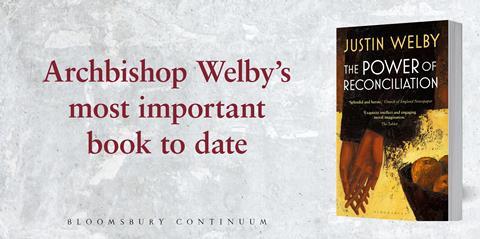Advertisement feature

In a world where conflict is widespread and we see increasingly polarized political and social strife, moves towards reconciliation are more necessary than ever.
In his most important book to date, Archbishop Justin Welby offers practical and insightful advice for both religious and secular communities on how to bring about reconciliation, from the household to the international stage. There is even a step-by-step guide, drawn from his first-hand experience of conflict resolution both in his career as a corporate executive and as leader of the global Anglical Communion, helping people work through their differences all over the world.

The Power of Reconciliation explores reconciliation as seeking to disagree well, and allowing for the dignity of difference. Down-to-earth and grounded in reality, this is a book full of profound hopefulness for the future – as is evident in the below, edited extract from the introduction:
“Reconciliation must be made flesh if it is going to be real. It must transform the lives of the weak, it must protect and it must go on trying even when it fails again and again. To give up is to accept, as though through scientific experiment, that the will to power of so many people is an undeniable absolute of being human. The will to power, the formation of identity through defining ourselves as what we are not, or by targeting another group as enemies, has become acceptable since the early twentieth century as being what makes for success, satisfaction, virtue.
With the will to power, coming from within ourselves, from pride and desire, there is no space for the ordinarily human, for the good community. Power hates weakness, and boasts that it never explains, never apologizes. It cannot abide reconciliation, which requires listening to another view, even putting oneself or one’s group in the shoes of the other. Power will neither offer nor receive forgiveness. As a result, the enemy must be cancelled, perhaps physically, but certainly emotionally and if possible in public esteem.
… The aim of this book is to encourage peacebuilding at all levels, recognizing the difficulties but turning the abstract idea of reconciliation into something that can be done throughout life, enabling the flourishing of robust diversity and disagreement without hatred. A society and a world that renews the idea of peace gives a basis for hope of differences being the seed of growth, and not of automatic rejection of all that we disagree with and of hostility towards those who disagree.
Safety for our future is not found by seeking it, but by engaging with those who challenge us. Identity is not made by defining ourselves against others in hatred and by seeking domination: the habits of reconciliation and peacebuilding liberate our identities, preserve our autonomy, increase our safety and show us the common good.”
The Power of Reconciliation is available to buy now in paperback at www.bloomsbury.com.


























